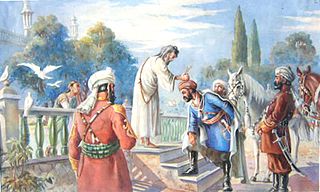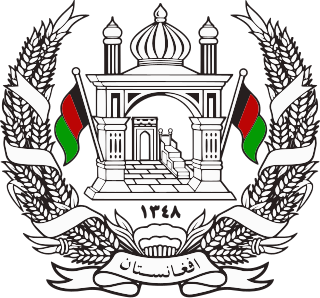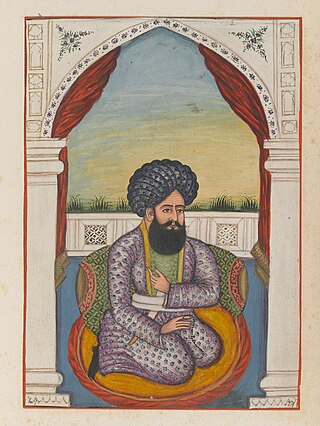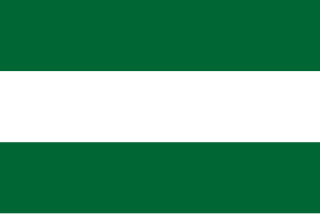Related Research Articles

Emir Dost Mohammad Khan Barakzai, nicknamed the Amir-i Kabir, was the founder of the Barakzai dynasty and one of the prominent rulers of Afghanistan during the First Anglo-Afghan War. With the decline of the Durrani dynasty, he became the Emir of Afghanistan in 1826. He was the 11th son of Payendah Khan, chief of the Barakzai Pashtuns, who was killed in 1799 by King Zaman Shah Durrani.

Sher Ali Khan was Amir of Afghanistan from 1863 to 1866 and from 1868 until his death in 1879. He was one of the sons of Dost Mohammed Khan, founder of the Barakzai dynasty in Afghanistan.

Sardar Mohammad Azim Khan Barakzai was a Pashtun noble who served as Afghan governor of Kashmir (1812–1819). He was the second son of the Barakzai chief Payinda Sarfaraz Khan, while his elder brother Fateh Khan was kingmaker and Vizier to Mahmud Shah Durrani. He was one of 21 brothers from eight mothers including his half-brother Dost Mohammad Khan who would later become Emir of Afghanistan.

Nawab Bahadur Yar Jung was an Indian politician and foremost Muslim leader in the Hyderabad Deccan. He founded All India Majlis-e-Ittehadul Muslimeen and the branches of Khaksars in Hyderabad and was known as a powerful religious preacher. In 1938, he was elected the President of Majlis-e-Ittehadul Muslimeen, a position in which he served till his death.

The Durrānī, formerly known as Abdālī (ابدالي), are one of the largest tribes of Pashtuns. Their traditional homeland is in southern Afghanistan, straddling into Toba Achakzai in Balochistan, Pakistan, but they are also settled in other parts of Afghanistan and parts of Khyber Pakhtunkhwa in Pakistan.

Mohammadzai, also spelled Moḥammadzay, is a Pashtun sub-tribe or clan of the Barakzai which is part of the Durrani confederacy of tribes. They are primarily centered on Kandahar, Kabul and Ghazni in Afghanistan. The Mohammadzai ruled Afghanistan from 1823 to 1978, for a total of 155 years. Their rule ended under Daoud Khan when the Communists took power via a Soviet-backed coup.

Hari Singh Nalwa was Commander-in-chief of the Sikh Khalsa Fauj, the army of the Sikh Empire. He is known for his role in the conquests of Kasur, Sialkot, Attock, Multan, Kashmir, Peshawar and Jamrud. Hari Singh Nalwa was responsible for expanding the frontier of Sikh Empire to beyond the Indus River right up to the mouth of the Khyber Pass. At the time of his death, the western boundary of the empire was Jamrud.

Alakozai is a Pashtun tribe in Afghanistan. They are one of the four tribes of the Zirak tribal confederacy of Durrani Pashtuns.

The Barakzai dynasty also known as the Muhammadzai dynasty ruled modern day Afghanistan from 1823 to 1978 when the monarchy ended de jure under Musahiban Mohammad Zahir Shah and de facto under his cousin Sardar Mohammad Daoud Khan. The Barakzai dynasty was established by Dost Mohammad Khan after the Durrani dynasty of Ahmad Shah Durrani was removed from power. As the Pahlavi era in Iran, the Muhammadzai era was known for its progressivist modernity in which Afghanistan was referred to as the "Switzerland of Asia".

The Pashtun tribes, are tribes of the Pashtun people, a large Eastern Iranian ethnic group who speak the Pashto language and follow Pashtunwali, the social code of conduct for Pashtuns. They are found primarily in Afghanistan and Pakistan and form the world's largest tribal society, comprising over 60 million people and between 350 and 400 tribes and clans. They are traditionally divided into four tribal confederacies: the Sarbani (سړبني), the Bettani (بېټني), the Ghurghusht (غرغښت), the Karlani (کرلاڼي) and a few allied tribes of those that are Ismailkhel, Khel, Ludin, Sakzai, and Zai.
Jon Mohammad Barakzai is an Afghan man who was held in extrajudicial detention in the United States Guantanamo Bay detention camps, in Cuba. Mohammed was repatriated in October 2002, together with three elderly men, two Afghanis and a Pakistani. The men described being chained, for hours, during their interrogations.

Kamran Shah Durrani was born in the Sadozai dynasty. He was the son of Mahmud Shah Durrani, grandson of Timur Shah Durrani and the great grandson of Ahmad Shah Durrani, the founder of the Durrani Empire. He was deposed and killed in early 1842, by his vizier Yar Mohammad Khan Alakozai.
Major General Ghulam Haidar Rasuli was born in Rostaq, Takhar Province, Afghanistan and a supporter of Mohammed Daoud Khan, who came out of retirement after the 1973 coup which removed King Zahir Shah and put Daoud in power. He received early military education at the Military High School, graduating in 1933, before receiving military training in India from 1956 to 1958. In 1966, he became the director of recruitment in the Ministry of National Defense. He was placed in charge of the Central Forces of Afghanistan in 1973 and became Chief of General Staff two years later. Rasuli was appointed Minister of Defense of Afghanistan on 7 November 1977, but was killed on 28 April during the 1978 Saur Revolution. Major Gen. Ghulam Haidar Rasuli was the son of Ghulam Rasul a Muhammadzai Barakzai from Kandahar. Ghulam Haidar Rasuli was the great grandson of the Amir Mohammad khan, brother of Amir Dost Muhammad khan Barakzai from the muhammadzai Barakzai tribe.

Bārakzai is the name of a Pashtun tribe from present-day, Kandahar, Afghanistan. '"Barakzai" is a common name among the Pashtuns and it means "son of Barak" in Pashto. According to the Encyclopædia Iranica, "In the detailed Pashtun genealogies there are no fewer than seven instances of the ethnic name Bārakzī, at very different levels of tribal segmentation. Six of them designate simple lineages within six different tribes located in the Solaymān mountains or adjacent lands... The seventh instance, on the other hand, designates one of the most important Pashtun tribes in numbers and historic role, part of the Zīrak branch of the Dorrānay confederation.
Yar Mohammed may refer to:
The 2013 Afghan Premier League was the second season of Afghan Premier League, the Afghan league for association football clubs, since its establishment in 2012. The season began on 22 August 2013 with the group stage and ended the season with the final on 11 October 2013. Toofaan Harirod head into the season as the defending champions. In the final, Shaheen Asmayee F.C. won their first title, beating Simorgh Alborz F.C., 3–1, in extra time.

Sultan Mohammad Khan, also known as Ghazi Sardar Sultan Mohammad Talaei, and known by his epithet, Sultan Mohammad Khan the Golden was an Afghan chief minister and regent. He was a powerful brother of Emir Dost Mohammad Khan, the eventual ruler of Afghanistan who seized control of Kabul from him. Prior to and during the reign of Dost Mohammad Khan, Sultan Muhammad Khan Telai was chief minister and governor of various regions of Afghanistan, including Kabul, Peshawar and Kohat. He was the first of the Musahiban, a Mohammadzai dynasty that began with him and ruled Afghanistan for more than 150 years, in various forms such as emir, king or president from 1823 to 1978.

The Principality of Herat, the Emirate of Herat, the Herat Khanate or simply Herat was a state in Afghanistan from 1793 to 1863, and one of the 3 main khanates in 19th century Afghanistan.
The Maimana Khanate was an Uzbek Khanate in Northern Afghanistan centered around the town of Maimana. It was founded in 1747 with the death of Nader Shah. The Mings had been the governors of Maimana since 1621. Hajji Bi Ming was the first independent ruler of the khanate. After the death of Ahmad Khan in 1814, Sar-i Pul seceded from the khanate. In the 1830s Sar-i Pul took the district of Gurziwan from Maimana. The Aimaq tribes of the Murghab broke away from Maimana by 1845. In 1847 and 1850 it resisted attempts by the Emirate of Herat to annex it. In 1875 the khanate rebelled against Afghanistan but it was crushed and the city sacked. In 1892 the khanate was annexed by Afghanistan.
References
- ↑ Yar Mohammed Barakzai's profile at Sports Reference.com
- ↑ "Yar Mohammed Barakzai". Olympedia. Retrieved 22 October 2021.
